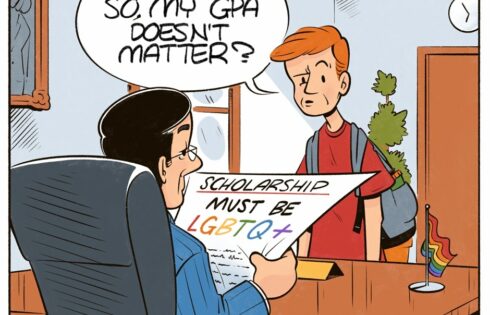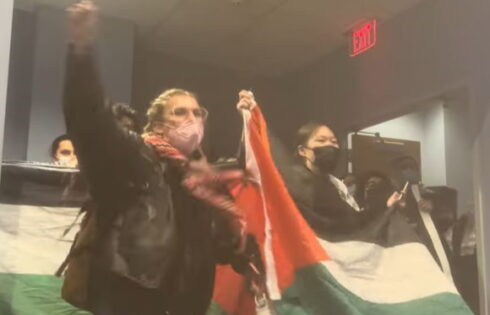
One of the odder spectacles we’ve seen in 2015 is radical feminists being coopted by anti-Israel activists.
That effort has sparked outrage and division in feminist ranks, threatening the efficacy of a movement whose quest to redefine rape, punish the accused on thin evidence and propagate dubious statistics has yet to falter in the U.S.
More broadly, it illustrates the ludicrous and deeply impractical side of “intersectionality,” the latest academic fad, which insists that disparate groups must agree on everything or else treat each other as enemies.
It happened when the National Women’s Studies Association voted last month to endorse the boycott, divestment and sanctions movement against Israel – the most progressive nation in the Middle East – with one member lamenting that “I do not feel I can express my Jewish voice within the progressive community” anymore.
RELATED: Women’s studies academics vote to support BDS, with token reference to ‘academic rights’
Sweden’s foreign minister, who has promised to lead a “feminist foreign policy,” did the same in “singling out Israel for criticism in the Middle East” – enraging a member of the Israeli parliament who is a former women’s studies professor, the Jerusalem Post reported.
Now it’s happening at Columbia University, according to a former “core organizer” of the sexual-assault awareness group No Red Tape.
You’ve attacked a ‘safe space’ with your Israel hatred
Julia Crain wrote in the Columbia Daily Spectator that the student government of Barnard College, affiliated with Columbia, should decline to endorse the demands of No Red Tape because it adopted an official “anti-Israel stance” this semester:
The Israeli-Palestinian conflict is arguably the most divisive issue on campus; by picking a side, No Red Tape effectively politicized anti-sexual violence work on this campus. Doing so is detrimental to the cause and unfair to pro-Israel survivors.
RELATED: Dartmouth whine fest examines ‘intersectionality’ to see who’s more oppressed, privileged
No Red Tape is no longer a “safe space” for all victims of assault and has “reneged on its promise to be ‘survivor-centric,'” Crain said, and the Barnard student government should not reward its “harmful conflation of two disparate issues”:
If NRT truly cares about supporting survivors on this campus and eradicating sexual violence within our student body, it shouldn’t alienate massive groups of students.
That very “conflation” led to a public spat at a student government meeting last week, in which No Red Tape backers tried to convince a pro-Israel contingent that endorsing its petition wouldn’t endorse an anti-Israel message.
It’s a testament to the divisiveness of aligning with Students for Justice in Palestine that Barnard student leaders still haven’t decided whether to endorse No Red Tape’s petition – something they would have otherwise done in a heartbeat.
RELATED: Columbia activists unite every social justice warrior cause in modest intersectional rally
Lectured by a man at anti-rape rally
The Daily Beast noted that intersectionality has become “a huge priority for feminist and sexual assault advocacy groups” who want to give “equal support and attention to minority victims of sexual assault” – apparently referring to Palestinian victims of Israeli rape, but making Israel itself guilty of the figurative rape of Palestine.
The publication traced the beginnings of the Columbia rift back to the “Carrying the Weight Together” rally a year ago for alleged victim Emma Sulkowicz (whose purported attacker has been cleared by both Columbia and the legal system).
A male member of Students for Justice in Palestine “was invited” to address the rally, which bothered one activist so much she wrote an essay in the Columbia “Jewish affairs” journal Current:
[W]hy at a protest against sexual assault, where Jewish students and Jewish groups participated and wholeheartedly supported the cause? If intelligent and liberal-minded students can’t unilaterally stand behind a protest for fewer rapists at Columbia, something is broken about activism on campus. …
Other women at the rally were survivors themselves. The fact that a man from Students for Justice in Palestine can marginalize a woman survivor of sexual assault at her own college campus at a protest to combat rape culture is completely illogical.
Rikki Novetsky, who has since graduated, wrote that grouping a bunch of different activists together
as a singular coalition of radical left-wing politics at Columbia begs the question of whether an individual student can be an authentic and legitimate advocate for one of the groups while being strongly and perhaps even viscerally opposed to another. …
I do not seek campus-wide harmony on many issues, but the fight against rape culture is a battle won in in numbers.
That’s the point exactly – when you elevate the necessity of one cause, you don’t dilute it by needlessly joining it to other causes. The very premise of a big tent is to gather people of diverse views to pursue one common goal – not to force assent on every issue held dear by each interest.
Intersectionality nearly ruined the pro-life movement
This has bothered me going on two decades in the pro-life movement, which has long been dominated by Christian conservatives who have a tendency to slide effortlessly between the sanctity of life and the tenets of orthodox Christian faith.
RELATED: FemmeFest and Intersectional Feminists continue the ‘fight for equality’ at Ohio State
That’s well and good in their congregations, but it also seeps into their public advocacy, as indicated by a recent Christ-themed message from Online for Life.
Christmas is made possible by Christ — and a pregnancy that stunned the world.
Posted by Online for Life on Sunday, December 13, 2015
What is an unconventional pro-lifer – secular, feminist, LGBT, Jewish or Muslim – supposed to do with that? It’s one of the reasons I believe that pro-life activists have made such halting progress in their movement over 40-odd years – if not in legislation and litigation, then certainly in cultural terms.
It’s why David Daleiden’s LGBT outreach is so important for his cause of exposing the seedy underbelly of the abortion industry.
It’s the reason I became an ardent backer of Feminists for Life in college and now Secular Pro-Life – these are groups who clearly understand that you don’t win an issue by marginalizing your allies. I don’t agree with everything they believe on every issue – who does that? – but we have a common goal of enshrining the dignity of the human being, regardless of his/her (or even “ze/xyr”) stage in life.
Intersectionality is the enemy of tolerance. It breeds suspicion in coalitions, pointlessly antagonizes people who agree on enough to achieve a goal, and teaches us all to be narrow-minded and stupid.
RELATED: Vandalism on Ivy League Campus Attacks Conservative as ‘Racist Rape Apologist’
RELATED: Student views on ‘affirmative consent’ may not jibe with campus orthodoxy
RELATED: 1 in 3 college women ‘are raped,’ Jesuit women’s conference tells attendees
Like The College Fix on Facebook / Follow us on Twitter
IMAGE: ChameleonsEye/Shutterstock






Please join the conversation about our stories on Facebook, Twitter, Instagram, Reddit, MeWe, Rumble, Gab, Minds and Gettr.